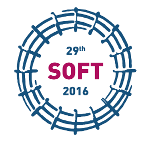Speaker
Fumito Okino
(Institute of Advanced Energy)
Description
DCLL blanket has high energy recovery efficiency. Nevertheless by several technical issues, such as MHD pressure drop, tritium permeation and energy conversion membrane corrosion, technical readiness level(TRL) of DCLL is relatively not high. To breakthrough this situation, the authors propose a new method to recover tritium and heat from liquid lithium-lead (PbLi) droplet by non-contact in vacuum. Tritium is released from droplet by advection mass transfer, and heat is emitted by radiation in a same chamber simultaneously. In vacuum, i.e. non-contact of liquid PbLi with wall and membrane, permeation and corrosion problems are expected to decrease drastically.
This study aimed the temperature decrease of PbLi from 700˚C to 550˚C after energy recovery, followed the preceding ARIES-ST study. Tritium recovery ratio is assumed higher than 90%. Calculation was performed by dividing the recovery chamber into blocks, each falling period of 0.1 sec. The emissivity on a falling PbLi droplet is not reported yet, then lower side data, 0.25, is used to maintain a conservative stance . The heat release time showed a critical role compared with tritium release, then calculation is concentrated on the temperature transition while falling. Results showed that a droplet diameter of 0.02-0.04 mm fulfilled the requirements, and atomizing droplets in vacuum was revealed a key factor of this method. Swirl method is also examined for atomization of PbLi under high temperature.
These results suggest the viability of dual non-contact extraction. However several issues such as, mutual interference of droplets, surface evaporation and assumed emissivity coefficient are neglected. Atomization of liquid PbLi is also another issue. Experimental verification is mandatory to confirm the results.
Co-authors
Fumito Okino
(Institute of Advanced Energy, Kyoto University, Kyoto-fu, Japan)
Ryuta Kasada
(Institute of Advanced Energy, Kyoto University, Kyoto-fu, Japan)
Satoshi Konishi
(Institute of Advanced Energy, Kyoto University, Kyoto-fu, Japan)

